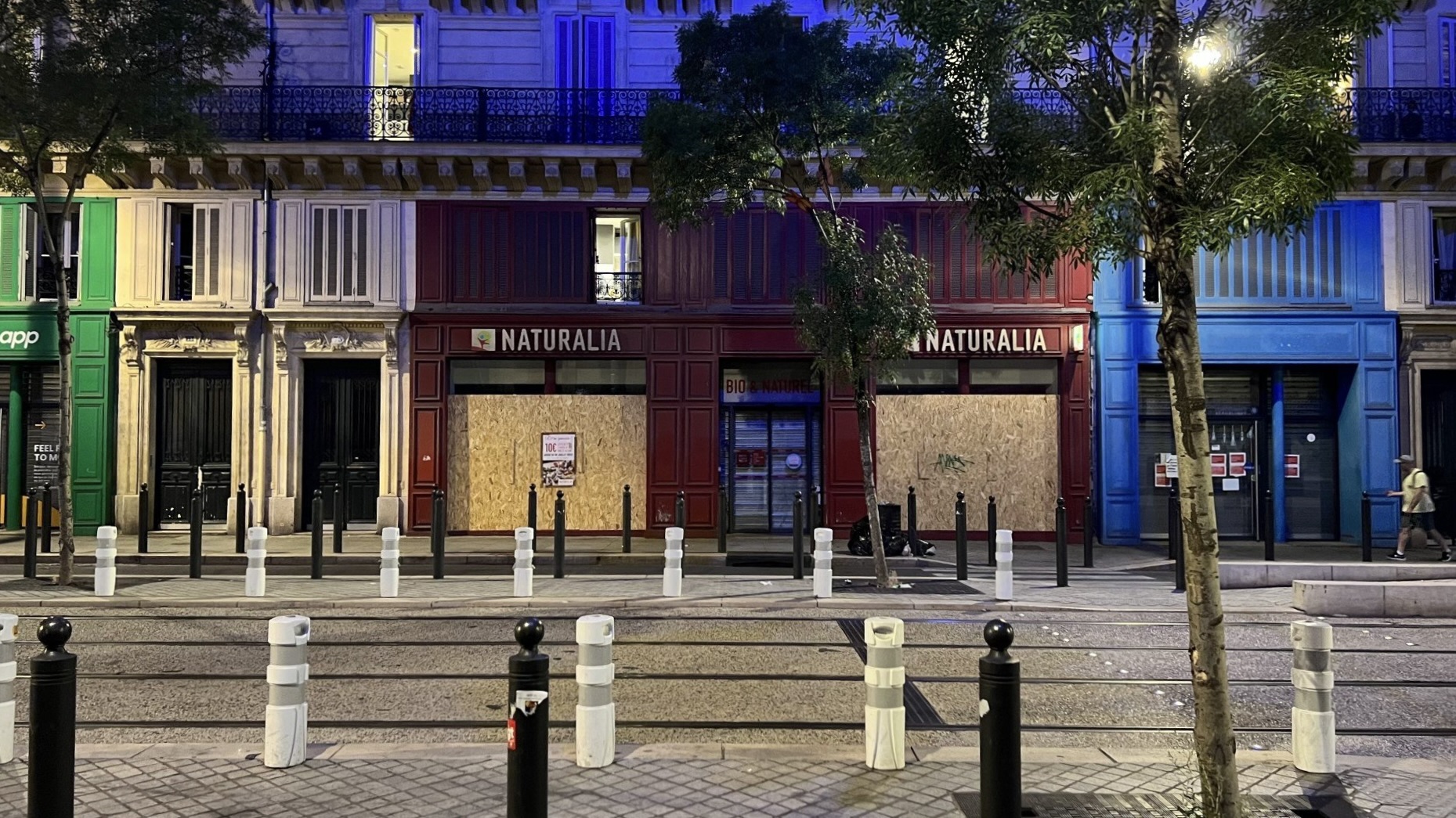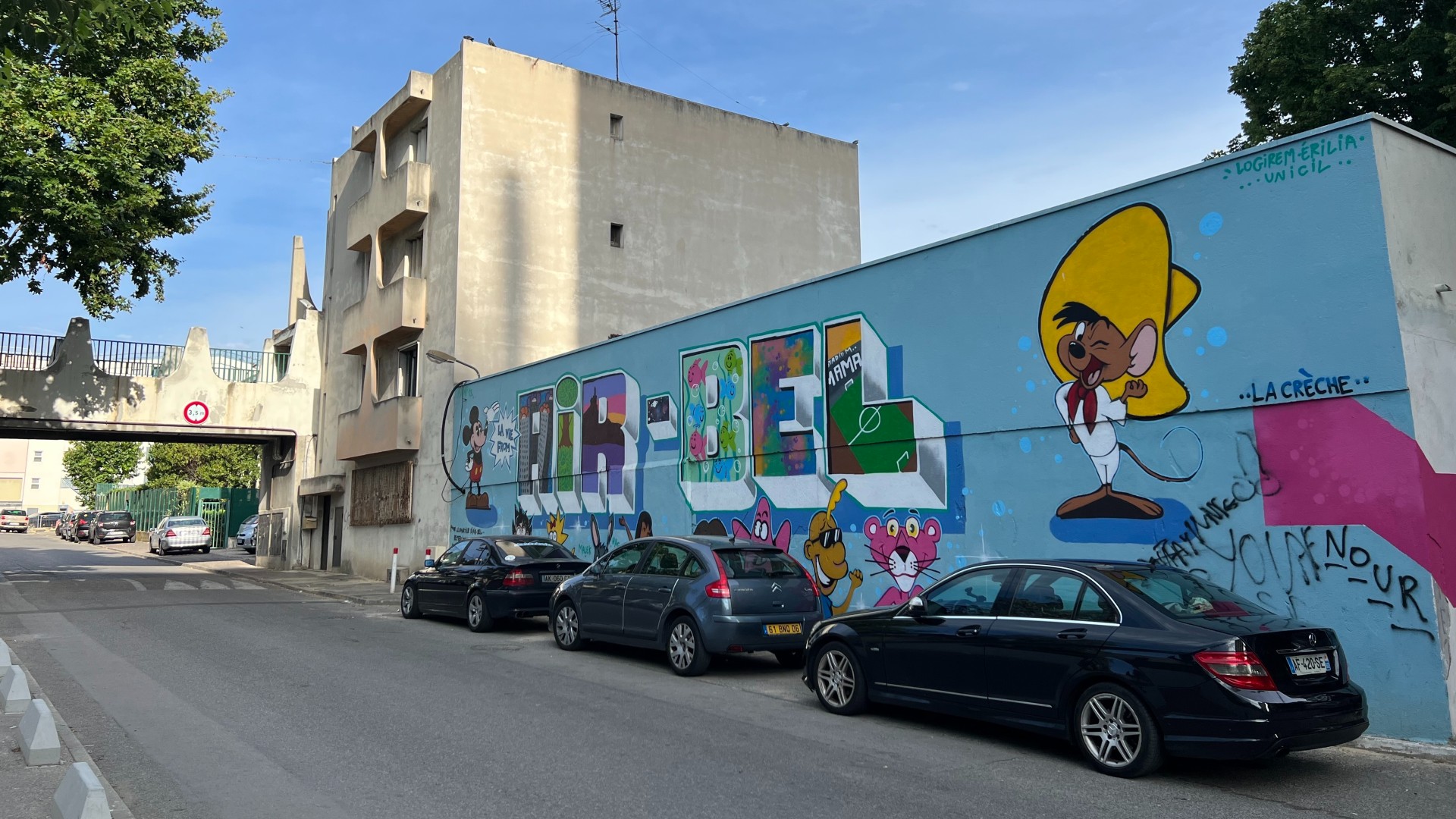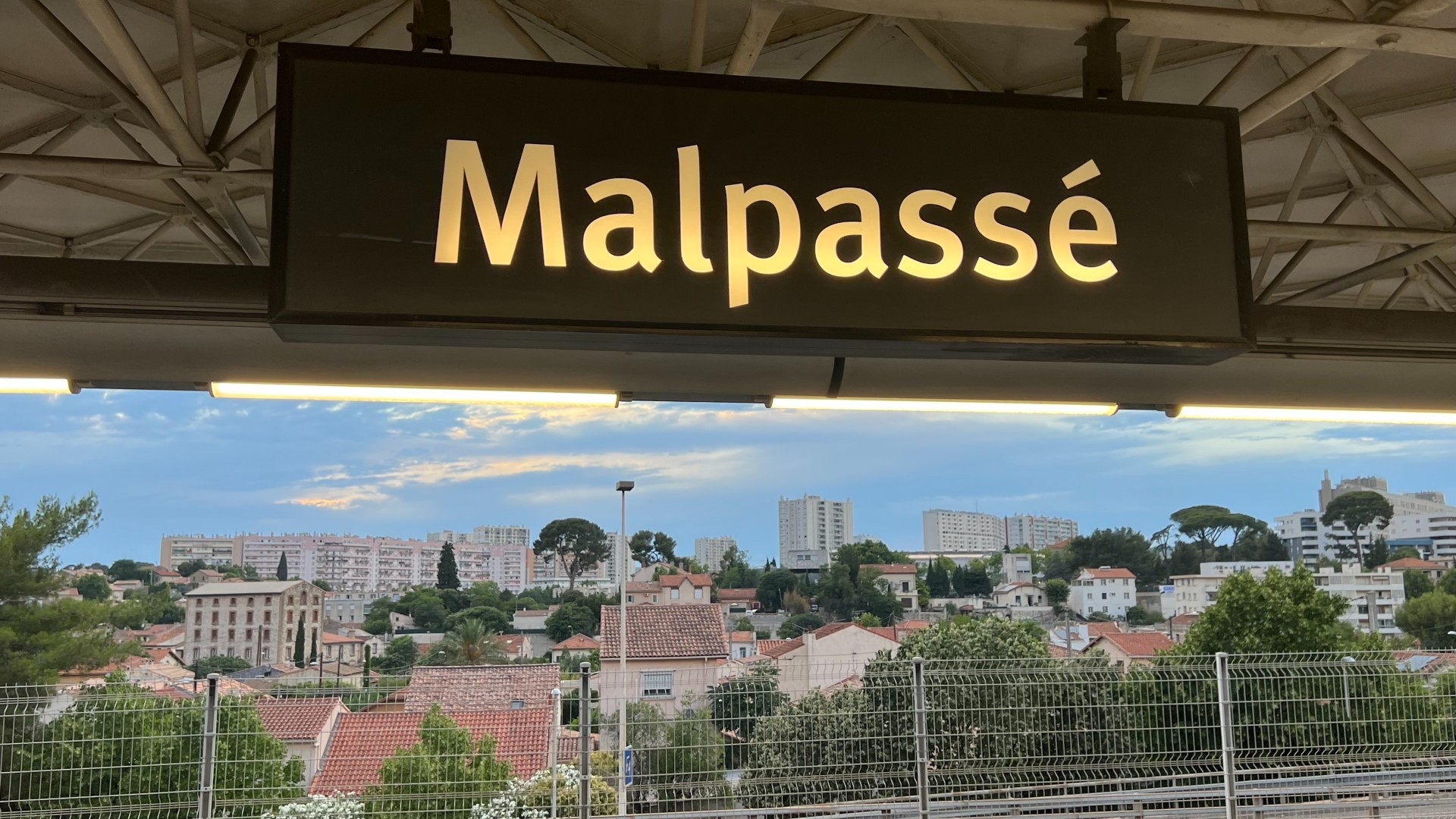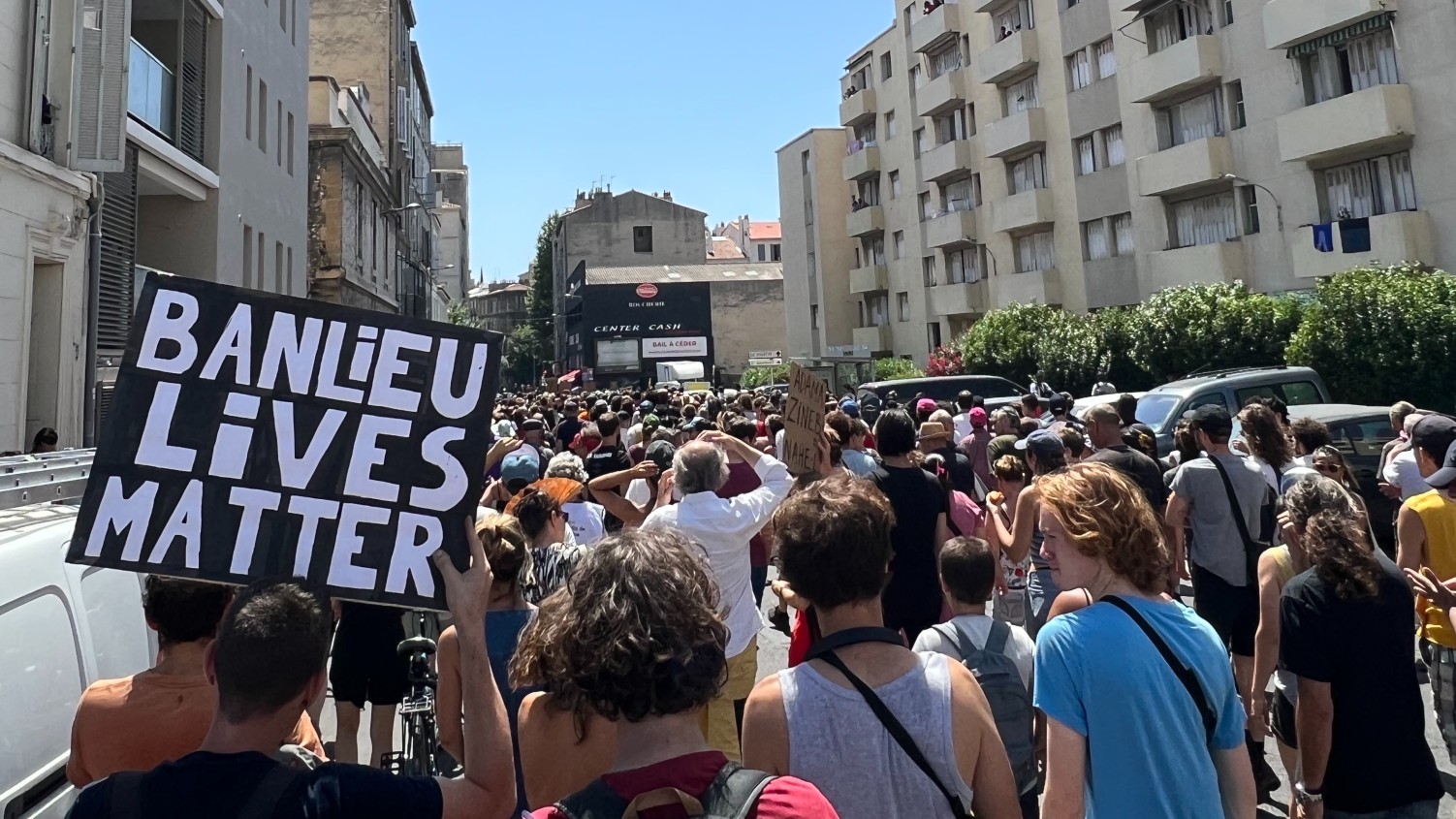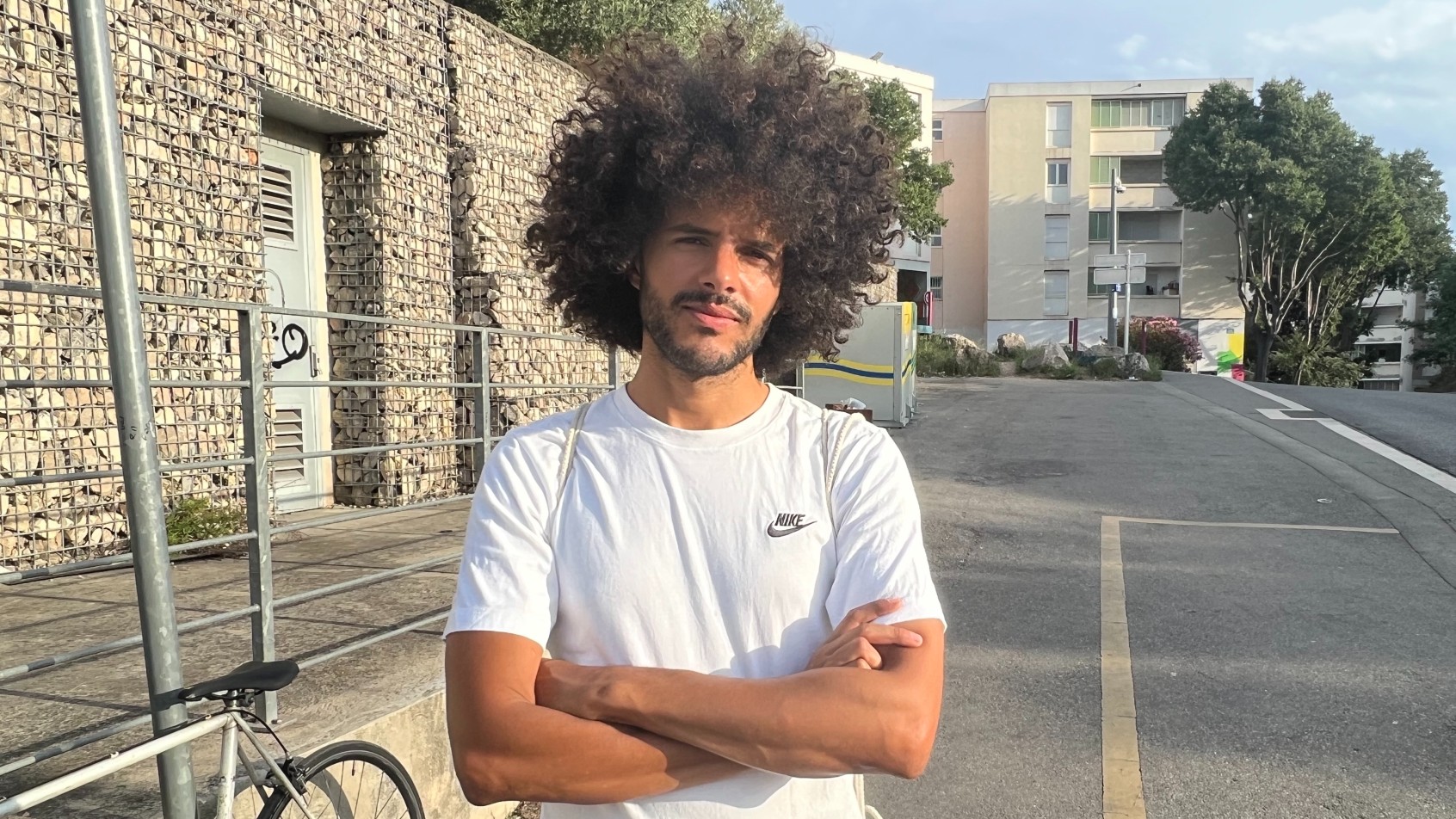
'The only solution is to leave': Suspected police killing intensifies misery in Marseille
As the tram wound its way through the hills of eastern Marseille, 10 or so police vans - with dark blue figures partially concealed behind tinted windows - made their way towards the city centre, down towards the sea.
"The police are imposing themselves," said Yassine Alami, a 30-year-old teacher, days after France was shaken by five nights of rioting and protests.
"They ID'd me cycling on the way up here," he added, gesturing up at the buildings of Air-Bel, one of Marseille's poorest housing estates. "They're trying to show they're in charge again."
The deadly police shooting of 17-year-old Nahel Merzouk ignited widespread unrest across France, with protests gripping the country and youth pillaging shops, setting fires, and pelting officers with projectiles.
In Marseille, buildings and vehicles were set alight and shop owners employed armed security for extra protection.
Stay informed with MEE's newsletters
Sign up to get the latest alerts, insights and analysis, starting with Turkey Unpacked
A week on, police continue to patrol the streets of the city, while some shops and banks remain boarded up.
In the courthouse by the city's spectacular Old Port, judges have already begun handing out heavy sentences: teenagers sent to jail for petty theft - or for just being nearby.
Ahead of Bastille Day this Friday, France's celebration of its revolution, authorities, fearing violence, have banned fireworks nationwide.
Meanwhile, another suspected police killing, this time in Marseille, has led to more unrest.
During the riots last Saturday night, 27-year-old UberEats driver Mohamed B died of a heart attack after being struck in the chest by a hard object.
His pregnant widow told reporters he had been filming the riots.
Marseille prosecutors are investigating "death involving the use of a weapon" consistent with a "flash-ball" - a dense rubber projectile fired by French police.
'We're seen as second-class'
- Samir Messikh, activist and Marseille resident
The police watchdog is looking into whether an officer pulled the trigger, one of 10 investigations into misconduct during the riots, including one incident in the northeast that left a 25-year-old security guard in a coma.
At dusk on Thursday, protesters gathered near Mohamed's home in the suburb of Air-Bel, which houses nearly 6,000 people, half of whom live below the poverty line.
By an underpass, Kaouther Ben Mohamed, an activist who grew up in Air-Bel, passed on a statement from Mohamed's mother.
"He was a father. His wife is pregnant with another child," she said.
"She [the mother] is not looking for vengeance, she's trying to understand what happened, and to bury her son. Then she'll hold the police accountable."
Beside her stood Mohamed's cousin, a clump of bandages covering his left eye. He too says he was hit by a flashball.
His friend Bouzid showed MEE a video of the wound: "He's got a hole there."
'Racism and discrimination'
If confirmed, Mohamed's death would be the first police killing since Merzouk's, but not the first in Marseille, where the long list of deaths stretches back decades.
In December 2018, Zineb Redouane, 80, was shot in the face by a police tear-gas grenade while closing the shutters of her fourth-floor apartment. No police officer has been charged or suspended.
And in August 2021, a trainee police officer shot 19-year-old father Souheil El Khalfaoui dead during a traffic stop, in a killing similar to Merzouk's.
During the unrest last week, a police trade union released a statement calling rioters "savage hordes" and "vermin".
On the same day, the UN called on France to "seriously address the deep issues of racism and discrimination in law enforcement”. The Council of Europe has previously condemned their "excessive use of force".
On Saturday, French police brutality again made headlines, when 29-year-old Youssouf Traore, whose brother Adama died in police custody in 2016, was violently arrested.
Marche pour #Adama, la brav M charge et interpelle des manifestants.#paris pic.twitter.com/kZCmJbA7bx
— Amar Taoualit (@TaoualitAmar) July 8, 2023
According to a fact check by the French newspaper Liberation, around half of the French police force support Marine Le Pen, the leader of the far-right National Rally.
The youngest daughter of far-right stalwart Jean-Marie Le Pen, she has blamed the riots on the "problem of immigration", which had "created in many people's minds a kind of secession from French society".
Many French people agree. A staggering 59 percent blamed the riots on "failings of migration policy". A fundraiser for the officer who killed Merzouk raised $1.76m (€1.6m) before it was closed.
Despite calling Merzouk's killing "inexcusable and inexplicable", French President Emmanuel Macron has been unwilling to frame violent protests as political or anti-police, blaming social media and calling on parents to keep their children at home.
"In France, when white people riot over pension reforms it's legitimate," said Joseph Downing, senior lecturer at Aston University, who lives in Marseille and studies France’s Muslims.
"When kids of a certain class or skin tone do it, it's 'disintegration’. But actually, if you understand France’s revolutionary history, it's one of the most French things they can do."
As one Marseillais asked: "Was May '68 not violent, too?"
'Nothing to lose'
Last week's unrest was France's worst since 2005, when two teenagers, Zyed Benna and Bouna Traore, were electrocuted in a Paris suburb while fleeing police.
Riots spread nationwide, but Marseille was relatively calm. This was attributed to its decreasing unemployment, its "rebellious streak," smart policing and the large number of community workers.
So what - besides the trigger of Merzouk's death - brought on the violence this time?
Samir Messikh, who runs an NGO in northern Marseille, blames structural racism in the country's justice system, institutions and police: "People are despairing."
Marseille used to have "proximity police" based in deprived areas. Activists have called for their return.
"Things used to be settled over a coffee. You should see the police checks now," said Messikh.
"We have to be careful not to attribute a singular cause to the protests," said Downing, "but one thing that's changed in the past 15-20 years is there's been a lot of regeneration and people moving to Marseille: your typical middle-class, artsy, white gentrifiers.
"Over the past five years people have repeatedly told me: 'I can't afford to rent in the neighbourhood I grew up in. These people don't talk to us. They look down on us'."
Then there's the lack of fulfilment for young, working-class people, says activist Amini. "Someone not from Marseille might say: 'They've got the sun, the sea and l'OM [Marseille football club]. But young people need more. When they are bored, plus there's no jobs, plus school or family problems, that's when things can explode."
He recalls some graffiti he saw during the riots: "We've got nothing to lose but this shitty life."
Parts of Marseille are also increasingly poor, especially in the north and - unlike most French city centres - the third arrondissement, by the port, is the poorest in France - and one of the poorest in Europe.
More than half of its population lives below the poverty line. It was also the site of some of the worst violence last week.
Many poor, working-class Marseillais are also fed up with the city's dreadful housing.
In 2018, two buildings collapsed in the central Noailles district, killing eight. The incident - and subsequent evacuations - revealed negligence of private landlords and authorities. A 2015 report had warned that 100,000 people in the city lived in unsanitary or unsafe housing.
Unlike in 2005, the sprawling housing estates to Marseille's north, known as les quartiers nord, also saw their share of violence last week.
Home to a quarter of the city's population, some 250,000, these are some of the most impoverished and isolated estates in France.
Built in the 1950s and 60s to house people whose homes had been bombed, immigrants and people returning from Algeria after the war, the quartiers are often described as cut off.
'Do we have hope? No. But we'll continue to fight - we'll never give up'
- Issam El Khalfaoui, father of police shooting victim, Souheil
Travelling in and out is notoriously bad, with no trams and few metro stops.
And while Marseille's unemployment rate has remained almost double that of the rest of the country since 2006, in the city's housing estates, that number has tripled.
There are only two libraries and one cinema in the 75km2 area, and debt is threatening to wipe out community centres. Class sizes are increasing too.
Wars between drug gangs have also made the quartiers nord increasingly dangerous. In 2021, a 14-year-old boy called Rayanne was shot dead on his way to buy a sandwich. There have been 23 gang-related deaths already this year.
"It's sad but in today's Marseille we are used to living in this insecure climate," said Soilihi Mirihane, a 25-year-old who grew up in the 13th arrondissement.
He recalls hearing shots outside his wife's apartment block on their wedding night. Several people he grew up with are either dead or in prison.
Marseille en Grand
Macron has projected an affinity for Marseille, his "favourite city" and favourite football team.
In September 2021, he announced a plan - "Marseille en Grand" - to invest $5.5bn (€5bn) in the city's police, schools, urban spaces and public transport. Yet in the 2022 presidential election, Marseillais favoured far-left candidate Jean-Luc Melenchon, and Macron only beat Le Pen by two points in the first round in Marseille.
The day before Nahel was shot dead in Paris, Macron visited the 14th arrondissement of northern Marseille to announce part two of his "Marseille en Grand" plan, including measures to combat "education inequality".
It wasn't the hero's welcome he might have hoped for. In a gym in La Busserine, with a heavy security presence outside, locals challenged him for an hour.
"Everyone has made sure to make you believe that everything is fine, that we're being taken care of," said one local, to applause. "It's not true."
Five minutes east stands Malpasse, a sprawling estate in the 13th arrondissement that is home to more than 10,000 people, 6,000 of whom live below the poverty line.
Driving into the quartier, Messikh, a 39-year-old who grew up here after moving over from east Algeria, beeps hello at some children playing.
"They don't invest in the economy in the [quartiers] nord. If a kid is born here, they get to 12, 14 years-old, what are they going to do with their life?" Youth unemployment here is over 40 percent.
"There's nowhere for us to even drink a coffee."
Messikh lives outside the area now, with his wife and two children. But he volunteers with the local NGO Les Farandoleurs, running educational and social projects, including open-air film screenings on the local football pitch.
Towering over the football stadium, like a huge west stand, is the vast Les Lauriers estate, "one of the main drug trafficking networks in Marseille" and home to 400 apartments.
"Four hundred chicken coops," says Messikh, looking up at the monolith, hair gelled to one side. "That building alone is an entire village."
Locals have the pitch, a skate park and a community centre. That's all. With half of the local population under 25, they desperately need more.
The state spends money on areas like Malpasse; Messikh's NGO recently received $40,000 (€37,000). But information on getting grants is labyrinthine - other local NGOs struggle for money - and critics say funds are misspent.
Nadia, 34, who has worked for 11 years in the local community centre and went to school here, helped consult authorities about what locals needed.
This included activity centres for children, educational support, sports facilities, culture (besides the motorbike museum), better transport, cleanliness and dignified housing.
The authorities built a skate park "which is good, but not what people wanted," said Nadia. Residents would have preferred authorities to re-open the swimming pool closed down 10 years ago.
What's more, the pitch is only open to the young people in the football club. "We turn away huge amounts of youngsters," says Ardi Ahmed, one of the coaches, who are all volunteers.
His young son wants to play tennis, he added, but there’s nowhere to play.
And there are no spaces just for girls.
Both Messikh and Nadia blame a culture of lacklustre project appraisals. Messikh said several "big NGOs" get money for working in the area but do nothing.
On Friday, during an MEE visit, Les Farandoulers hosted one of their film screenings. Teenagers scampered around on the football pitch as the sun set, Master KG’s Jerusalema playing over speakers. Families on blankets sat eating as they waited for the film to start.
"Where would they be if we hadn't put this on?" asked Messikh.
Kahna, a tall, 11-year-old girl, answered: "At home."
Middle East Eye repeatedly reached out to Marseille authorities for comment but did not receive a response by time of publication.
'First you're Muslim'
France doesn't collect statistics on skin colour or religion, but there are an estimated 300,000 Muslims in Marseille.
Most of the young female volunteers at "le stade", working on the makeshift food stall or helping with the screen, wear headscarfs. Some wear abayas: long garments worn by Muslim women.
Under France's hardline brand of secularism, laicite, which critics say has been used to keep Islam out of the public sphere, these "religious symbols" are not allowed in school.
Nadia says that in the last year a dozen Muslim girls - aged 16 and 17 - have complained of teaching staff humiliating them about their abayas.
"You're lucky I’m not telling you what I really think," one teacher reportedly told a girl, Nadia recalled.
Four have decided to study at home or stop school altogether, she added.
In 2021, Macron's government brought in the controversial "imam charter", to align French Islam with "Republican values". Critics have described it as "Islamophobic and discriminatory".
"We're seen as second-class," said Messikh. "Our French identity comes last. First you're Algerian, Arab, Muslim. 'You'll never be like us.'"
NGO president Mirihane, whose family comes from Comoros, added: "It's just watching [the football team] Olympique Marseille that everyone mixes.
"For 90 minutes, there's no race, no religion, no skin colour. We're all united. But it's only at the stadium that I ever feel that."
Pull to leave
Ardi Ahmed, who trains under-11s and under-fives at the Malpassé football club, says that even if "being abandoned can create resilience," things have been getting worse.
The violence in the quartier means "kids are scared of playing outside," said the 36-year-old.
"We try to teach them values, that they should never give up. But you have to see the kids, how they struggle. You have to see it.
'I used to think we could change things, but France is full of hatred. For me, the only solution is to leave'
- Ardi Ahmed, youth worker
"I used to think we could change things, but France is full of hatred. For me, the only solution is to leave."
Some, like 18-year-old Lubna Khelladi, want to stay in the area. She wants to open a children's activity centre.
But after more than a decade at the community centre, Nadia too wants to get out - to Canada or Morocco.
"This country no longer interests me, there's far too much injustice."
She tries to motivate young people until they’ve passed their baccalaureate, the A-levels equivalent. Then she tells them to leave: to Lyon, Toulouse, Paris even.
"What opportunities exist for them here?"
Sitting on a table in the football club, with the sun setting over the Lauriers building, Messikh admits he thinks about leaving "every day".
Ideally he'd live in Asia. Bali maybe, where being Muslim isn't seen as unusual.
"But I can't quit... my personal choices are driven by the plight of others.
"Leaving is part of the solution for some, just as our parents left their home countries. At some point we might leave, and it'll be a shame for France.
"We’re fatalistic because that's the way it is. We can’t just say that everything is okay."
'Model of integration'
On Saturday, a week after the suspicious death of Mohamed B, thousands of protesters gathered in Belle de Mai, Marseille's poorest area. "Banlieue Lives Matter" read one homemade sign.
As demonstrators assembled, Issam El Khalfaoui was handed a microphone. In August 2021, a trainee police officer shot and killed his 19-year-old son only a few streets away.
The inquest into his death was reopened when the family discovered videos of the incident had gone missing, but nothing has come of the case.
Addressing the hushed crowd, El Khalfaoui described himself as "a model of integration," saying for a while he convinced himself "his skin colour no longer mattered".
'We don't want privileges. We just want a redistribution of wealth and equality of opportunity'
- Issam El Khalfaoui, father of 19-year-old killed by police
"Until the gruesome day my son, Souheil, took a bullet to the heart here in Marseille," he said, voice trembling. "A brutal awakening. Racism caught up with me. I say caught up but it never really left me, I had just learned to live with it, rather than fight."
"We don't want privileges. We just want a redistribution of wealth and equality of opportunity, for our young people to benefit from the same education… to thrive in life, their hobbies, their work.
"Do we have hope? No," El Khalfaoui told MEE during the protest. "But we'll continue to fight - we'll never give up."
Beyond its sun-baked apartment blocks and cedar trees, the Air-Bel estate gives way to Olympique Marseille's ground, le stade velodrome, and the green hills to the south.
Here, in 2017, a 46-year-old called Djamel died of legionellosis, a lung infection. One month later, the same bacteria was found in the pipes supplying water to the estate’s 6,000 inhabitants. Six years on, it remains a problem.
"You never know what colour it will run," Sabrina, a mother of four, recently told France Bleu Provence.
"Sometimes it's yellow, sometimes brown, it constantly smells of chlorine. We don't drink it."
Cicadas buzz as activist and teacher Yassine Alami walks across the grassy wasteland between the clusters of beige buildings.
"If this was a middle-class area, the grass we're walking on would be a garden," he said. "Instead we’re somewhere where there’s no drinking water."
New-build apartments look down on the road across from the estate. On the bridge linking the two contrasting complexes, someone has sprayed: "Revenge for Mohamed."
This article is available in French on Middle East Eye French edition.
Middle East Eye delivers independent and unrivalled coverage and analysis of the Middle East, North Africa and beyond. To learn more about republishing this content and the associated fees, please fill out this form. More about MEE can be found here.


